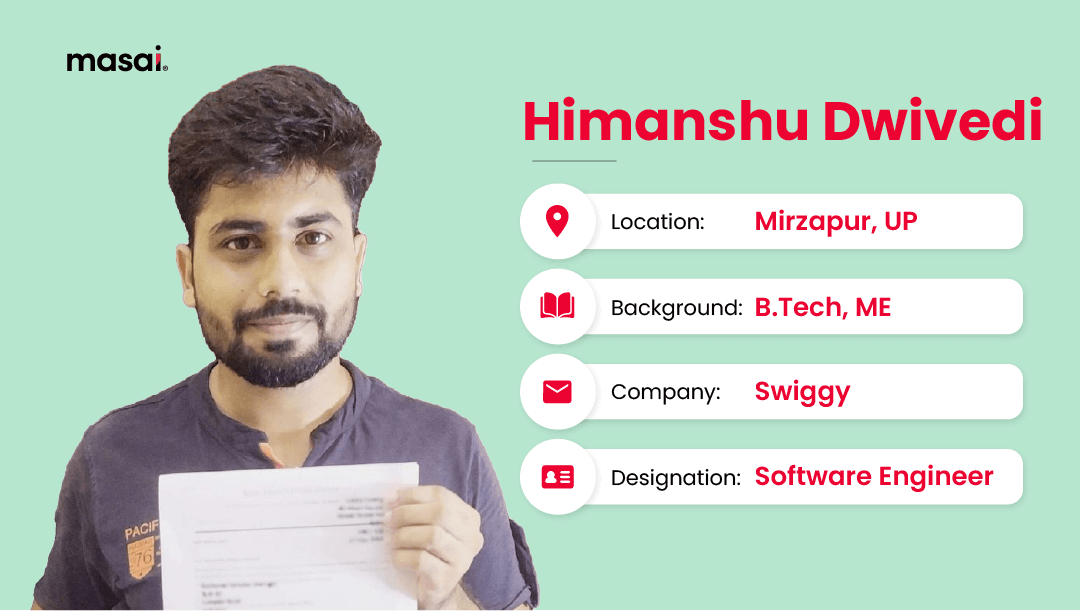Struggling GATE aspirant to a Software Engineer at Swiggy - Meet Himanshu
"I have experienced a huge mental shift from the time I didn't have enough experience in coding to now. Previously, I tried to stay away from it as I didn’t have much experience. But now, I'm always looking forward to working on new tech stacks and growing in the Software industry."

Himanshu was well on his way to crack GATE exams, when he had to leave his preparations in the middle and start looking for a job due to financial hurdles.
He tried his hands in several companies but none of them were willing to hire a fresher coming from a mechanical engineering background.
Depressed and clueless for months, he finally decided to switch to programming and joined Masai School in pursuit of a better career.
Today, he’s working as a Software engineer for the food delivery startup – Swiggy.
How did he transition from Mechanical engineering to Software engineering? Let’s hear from him-
Tell us about yourself
I’m 25 years old, born & brought up in Mirzapur, UP ( a lot of people know about it now, for obvious reasons). I started schooling through UP board but then my dad shifted me to a CBSE board school at Varanasi. I must admit, I had to struggle in the beginning due to the English based curriculum.
How was your higher education?
After 12th, I opted for engineering because of my interest towards fixing and building things.
I took admission in GLA University choosing the mechanical branch (Mech Eng.), influenced by my father’s line of work.
Honestly, I had never thought of being a part of the IT industry.
I had been preparing for GATE since the first day of my college. I never even went into the placement process at college because there were limited opportunities, and my eyesight was fixed on cracking the GATE exams.
What were your plans after College?
After finishing college, I started on the route to GATE but destiny had some other plans.
Due to financial struggles at home, I started looking for a job.
That was a whole another challenge as every company wanted an experienced candidate.
That’s one harsh reality of the job sector.
“All companies want experience but no one is ready to give that experience”. It’s like a loop for freshers.
That was a depressing phase in my life, I was getting crazy thoughts.
How did you join Masai?
This one day, I got to know that one of my neighbours from Varanasi, who had the same career path as me, had started working as a Software engineer in an established tech company. I got to meet him once and he introduced me to Masai School telling me everything about the program.
Masai offers full-time and part-time training in Web development and Android development at zero initial cost. The Income Share Agreement allows you to pay only after getting a job worth 5 LPA or above. In a rare case if a student can’t get the said job, they don’t pay anything.
I remember him saying – “You would find 9-9-6 difficult but if you’re willing to build your career, you just have to go through it”
I took the test and got myself admitted in the Full Stack web development course. Initially, I wasn’t that confident about clearing the Unit tests as I had no prior coding experience. Though we had C and C++ in our college syllabus, I had never really concentrated on that.
But the Instructors and the IAs curbed all my fears with their mentoring and support. I remember having a session with Prateek (CEO, Masai School). The motivational bombs he dropped that day changed my thought process about things.
I realised that if I’m really true to my ambitions, I’ll enjoy the process and things wouldn’t seem difficult.
What did you learn at Masai to become a Software engineer?
I learned web development on the MERN stack which included-
- HTML, CSS
- JavaScript
- Data structures & algorithms(DSA)
- Developer tools & workflow
- React and react ecosystem
- UI libraries
- Redux and hooks
- Node.js and Express.js
- MongoDB
I feel DSA is one of the most crucial concept in learning programming. It helps you to think imaginatively and solve problems from the grassroots. (Click here to start with the basics of DSA)
How was your experience with the Masai team?
I’m just short of words for the whole team’s dedication to the cause. They don’t think of it as a job. They’re involved in every step of the process and they are ready to help even beyond their work hours.
My Instructional Associate(IA) said – “If you’re stuck in some part of the code, or you are unable to understand something, you can reach out to me any time whether it’s 12 AM midnight or 6 AM in the morning. If I’m available, I’ll help you”
(IAs at Masai connect on a personal level with students and help them in solving even the most basic doubts about the various concepts. Instructors and IAs work together to ensure communication at all levels with the bootcampers.)
How long did it take you to find a job after Masai?
After course completion, I wanted to stay with the Masai team and contribute to the cause. So, I joined as an IA, and my role was to help students in the next batches understand the concepts in programming. Exactly how my IA helped me in the process.
After working there for 8-9 months, I got placed in Swiggy as a Software engineer, where I’m working currently. (Know everything about Masai School placements)
What changes do you see in yourself after the Coding journey?
I have experienced a huge mental shift from the time I didn’t have enough experience in coding to now. Previously, I tried to stay away from it as I didn’t have much experience. But now, I’m always looking forward to working on new tech stacks and growing in the Software industry.
The most important thing I learned at Masai was – “How to learn”. Once you get that process right, you can learn anything.
And, I can’t forget to mention the vast improvement I have experienced in my communication skills, especially English speaking.
Himanshu sums it up with a key message to other aspiring developers-
“Be fully committed to your cause without any element of fear. If you’re willing to be a software engineer, you’ll have to trust the process and be confident that you’ll reach there no matter what.”

